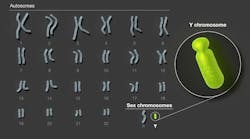New COVID-19 variants could potentially be contained where they arise using genetic sequencing, a new study from the University of Georgia has found. But it will require global cooperation.
Published in PNAS Nexus, the study found that standard methods that first assess a new variant’s severity are too slow to stop its spread. Next-generation genetic sequencing, however, offers a feasible alternative to spot new variants with enough time to contain variants where they first appear.
Genetic sequencing is a process by which researchers can determine the genetic makeup of an organism. In the case of COVID-19, some new variants, particularly the more concerning ones, have distinct differences in their genetic code. That means researchers can use genetic codes to detect new troubling variants.





